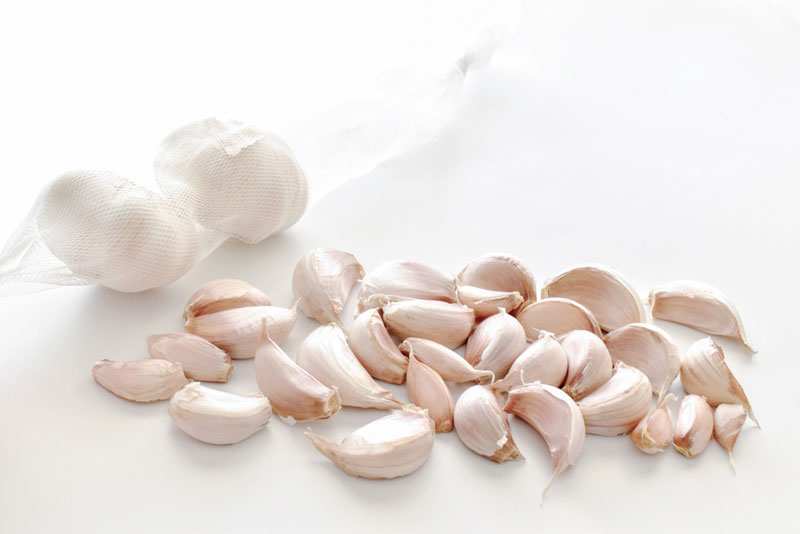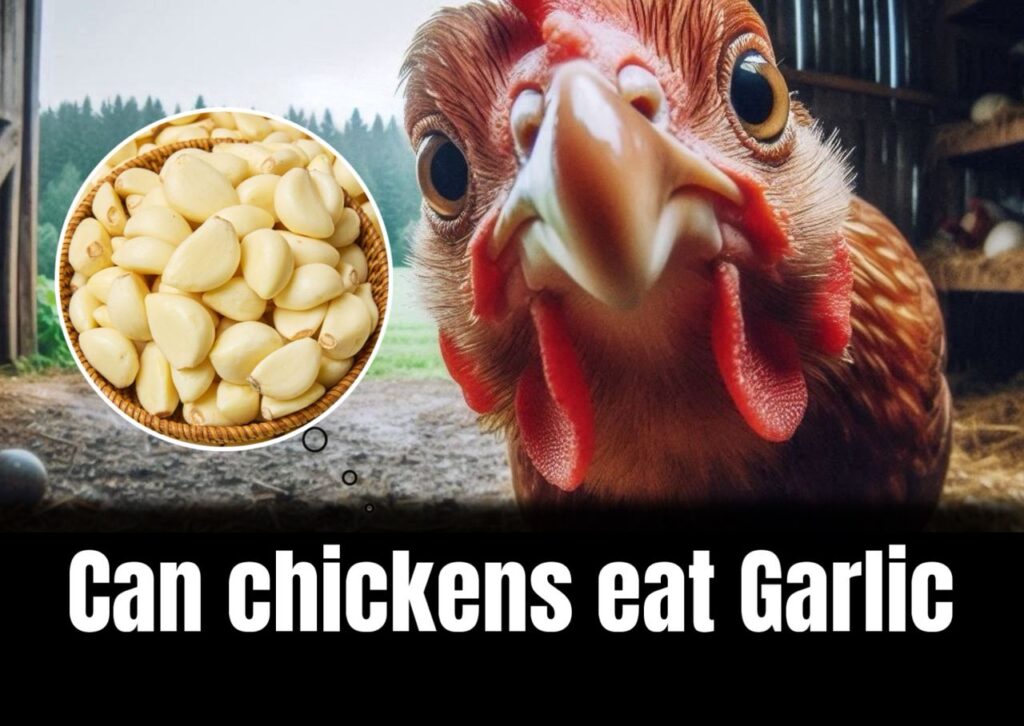If you are a chicken owner and wonder about all the things you can feed your feathered friends, you may have asked yourself, “Can chickens eat garlic?” It’s a great question! A lot of chicken keepers are exploring the best ways to keep their chickens healthy and happy with wholesome foods.
The short answer is YES, chickens can eat garlic, and they may even enjoy it in small amounts. But, how much can they eat? Are there benefits to giving them garlic? What are the potential risks?
We are going to unravel all of these questions together and more! Keep reading to learn everything you need to know about feeding garlic to chickens, as we cover the following topics:
- Can Chickens Eat Garlic?
- How Much Garlic Can Chickens Eat?
- Best Way to Feed Garlic to Chickens
- Benefits of Feeding Garlic to Chickens
- Risks and Dangers of Feeding Garlic to Chickens
- Substitutes for Garlic
Let’s jump right in!
Can Chickens Eat Garlic?

Chickens can eat a variety of foods, and garlic is one of them. Garlic belongs to the onion family and is widely known for its strong flavor and numerous health benefits. Usually, chickens will be curious about new foods, and garlic is no exception. They might even enjoy pecking at it. However, it is essential to understand that garlic should only be given in moderation.
Garlic has natural anti-bacterial and anti-fungal properties, making it beneficial in supporting the immune system of our chickens. Some backyard chicken enthusiasts even swear by garlic’s healing properties, claiming it can help keep common ailments at bay. Chicken caregivers should definitely be cautious though, as too much garlic can lead to digestive discomfort. Learning how to incorporate garlic thoughtfully into our chickens’ diets can help ensure they receive all the benefits without any drawbacks.
Before we’ve totally got garlic figured out, let’s take a closer look at how much garlic is suitable for our chickens!
How Much Garlic Can Chickens Eat?
When it comes to feeding garlic to chickens, moderation is critical. Typically, a clove or two of garlic per chicken is considered a safe amount. Feeding a chicken too much garlic can lead to issues such as digestive upset or even a condition known as hemolytic anemia. It’s also good to note that garlic is very strong in flavor, so starting with a small amount will help us see how our chickens respond before we increase the amount.
In practical terms, chopping or crushing the garlic can enhance the flavor and make it more appealing for chickens to consume. Adding garlic to their regular feed or mixing it into treats can be an effective way to introduce this healthy food. We want to ensure that we are always mindful and aware of our chickens’ reactions. For example, if we notice any signs of discomfort, it might be wise to reduce or eliminate garlic from their diet.
Chickens can be sensitive little creatures, so knowing our specific flock’s tolerance level is key. Each chicken is unique, and this knowledge will help us provide the best diet tailored to their needs.
Now that we’ve discussed how to introduce garlic carefully, let’s look at the best ways to serve garlic to our chickens!
Best Way to Feed Garlic to Chickens
Feeding garlic to chickens can be simple and rewarding. The most common way to introduce garlic is to add it directly to their feed or mix it into their favorite treats. Crushing or finely chopping garlic cloves helps make the nutrients more accessible and releases the flavor which can entice our chickens to enjoy it even more.
Remember, we don’t want to overwhelm our flock with garlic, so let’s aim for small amounts mixed in. For example, we can crush one clove and mix it with their usual feed or scatter some crushed garlic along with other treats. Garlic in a mash form can be very popular among chickens, providing a tasty snack that complements their regular diet.
Some chicken owners also recommend using garlic powder or dehydrated garlic. If we choose to use garlic powder, we should keep in mind the same rule of moderation, as concentrated forms can pack more flavor and nutrients than fresh garlic. We can sprinkle just a small amount of garlic powder in their food to give it that extra boost in flavor and health benefits.
While our chickens may love garlic, we should be cautious to avoid molding the garlic, as mold can be harmful to our flock.
Now that we have a few ways to feed garlic down, let’s discuss the many benefits of including garlic in our chickens’ diet!
Benefits of Feeding Garlic to Chickens
Hydration
Garlic can help promote good hydration for our chickens. When we incorporate garlic into their diet, it can act as a natural diuretic. This can be helpful in preventing certain conditions that might affect their kidneys and urinary systems. Proper hydration is essential for our chickens to maintain good health, and adding garlic can support this crucial need.
When our chickens are hydrated, it helps them stay active and lay eggs consistently. We can also provide plenty of fresh water to ensure they have the hydration they need alongside garlic.
Fiber
Chickens benefit from fibrous foods, and garlic can contribute to that necessary fiber intake. Fiber plays a significant role in proper digestion, helping maintain gut health. A healthy gut ensures that our chickens can absorb the nutrients they need for optimal growth and egg production.
Providing a balanced diet with adequate fiber promotes overall health and can prevent problems such as obesity in chickens. By feeding garlic along with other fibrous foods, we are working to keep our flock healthy and thriving.
Vitamins and Minerals
Garlic is known to contain valuable vitamins, including vitamin C and various B vitamins. These nutrients help support the immune system in both chickens and humans. Strong immune health is vital for preventing disease and managing stress in our flock. When our chickens consume a balanced diet with garlic, they get a nutritional boost that can help them stay resilient against illnesses.
Additionally, garlic also offers essential minerals like calcium, potassium, and selenium. These minerals contribute to strong bones, healthy muscle function, and a shiny feather coat. By providing garlic as part of their balanced diet, we can support their overall well-being.
Mental Stimulation
Chickens are intelligent animals and benefit from mental stimulation just as much as physical health. Introducing garlic can provide an exciting new flavor and smell that can pique their curiosity. We might find that our chickens become more engaged as they interact with this new and flavorful treat.
Offering garlic not only provides nutrition but also encourages our chickens to forage and explore. This goes a long way in creating a fulfilling and happy environment for our flock.
Nutritional breakdown of garlic
To further understand garlic’s benefits, we can look at its nutritional composition. Garlic is low in calories and high in various nutrients. A typical clove of garlic contains vitamins K and B6, manganese, and antioxidants. Antioxidants play a vital role in fighting off free radicals and keeping our chickens healthy.
By feeding garlic to our chickens, we can ensure they are getting a well-rounded source of nutrition. As we continue to discover new foods and understand their benefits, we are empowering our flock to live healthier lives.
Now, let’s turn our attention to the risks associated with feeding garlic!
Risks and Dangers of Feeding Garlic to Chickens
While garlic has benefits, we must also be aware of potential risks it may pose. Feeding too much garlic to our chickens can lead to issues like digestive disturbances, gas, or even an upset stomach. If we notice any sign of discomfort like lethargy or a decrease in appetite, we should consider reducing the garlic in their diet or removing it altogether.
Another concern is that excessive garlic consumption may contribute to hemolytic anemia, leading to harmful effects on the chicken’s red blood cells. This condition can arise when chickens eat onion family members, like garlic or onion, in large quantities over an extended time. Monitoring our chickens and ensuring that garlic is a small part of their overall diet can reduce this risk significantly.
It’s also crucial to consider our specific flock. Just like people, chickens can have unique sensitivities. Some Chicken breeds might tolerate garlic better than others. Therefore, when introducing garlic or any new food, it’s always a good practice to keep a close watch on how our flock reacts.
When in doubt, less garlic is always the way to go. Taking a cautious approach will enable us to avoid potential problems while still providing our chickens with the nutritious foods they deserve.
Next, let’s learn about some excellent substitutes for garlic if we choose not to include it in our chickens’ diet!
Substitutes for Garlic for Chickens
In case we decide to steer clear of garlic based on our flock’s preferences or sensitivities, there are several alternatives that can provide similar benefits.
One excellent substitute is herbs like oregano, thyme, and parsley. These herbs can be beneficial for chickens and add flavor to their usual feed. Oregano, in particular, has been known to have antimicrobial properties, making it a popular choice among chicken keepers for enhancing their flock’s health.
Another alternative is using spices such as ginger and turmeric. These spices serve as natural anti-inflammatory agents and can support the immune system, making them beneficial additions to our chickens’ diet.
Additionally, we can explore certain fruits and vegetables that offer high nutrient content. Leafy greens such as kale, spinach, or dandelion greens also provide essential vitamins and minerals. Incorporating a variety of foods in our chickens’ diet can help us achieve a balanced and healthy nutritional plan without relying upon garlic.
Let’s also explore some of the frequently asked questions about garlic in our chickens’ diets.
Frequently Asked Questions
Can I feed raw garlic to my chickens?
Yes, you can feed raw garlic to your chickens in moderation, but prepare it properly by crushing or chopping it to release its nutrients.
Can garlic help prevent internal parasites in chickens?
Some chicken owners believe that garlic may have anti-parasitic properties, but scientific evidence supporting this claim is limited. It can be a supplementary approach to keeping your flock healthy.
How often can I feed garlic to my chickens?
Garlic is best fed sparingly, maybe once a week or every few days, ensuring that it does not replace their main diet.
Will garlic change the taste of chicken eggs?
Garlic can influence the taste of the eggs, especially if consumed in larger quantities. If you plan to sell or use the eggs, consider moderation!
Is garlic powder a good alternative to fresh garlic?
Garlic powder can be used as an alternative but remember to use it in moderation, as it may be more concentrated than fresh garlic.
Final Thoughts
Feeding garlic to our chickens can be beneficial when done mindfully. It can promote hydration, provide essential vitamins and minerals, and even offer a little mental stimulation. However, we must remain cautious about the amount and watch for any adverse reactions.
As we explore new foods and expand our understanding of chickens’ nutrition, we empower ourselves and our flocks to live healthier lives. If you want to learn more about other treats, like grapes, check out our guide on feeding grapes to chickens. Stay curious and happy clucking!






